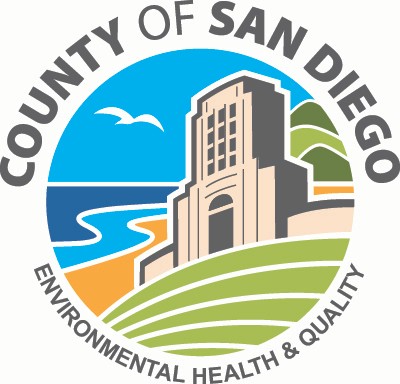
Prior to 2012, under the California Retail Food Code (CRFC), food
sold to consumers was required to be made at an inspected commercial
kitchen. When the California Homemade Food Act, known as “cottage food
operations”, was enacted in 2013, certain low-risk food products that
do not require refrigeration, such as bread, pie, fruit jam, and dried
food, could be made in private home kitchens, and sold to consumers
under limited conditions.
On September 18, 2018, Governor Brown signed Assembly Bill 626 (AB
626), California Retail Food Code: Microenterprise Home Kitchen
Operations. This bill established a “microenterprise home kitchen
operation” (MEHKO) as a new category of retail food facility and
required a program to be approved by local jurisdictions prior to
MEHKOs being able to operate or be permitted.
| Microenterprise Home Kitchen Operations (MEHKO) |
As part of action taken by the County Board of Supervisors, a permanent San Diego County Microenterprise Home Kitchen Operation (MEHKO) program went into effect on January 5, 2024. New operators interested in starting a MEHKO are required to submit a Health Permit Application, Standard Operating Procedures, and Food Safety Manager Certificate at the time of application. Key
programmatic guidance documents are provided below, and you
can also click here
to watch a video of our MEHKO Program Training Workshop that
provides general program details as well as guidance on how to
properly complete the health permit application and the
Standard Operation Procedures. |
To view this video in your preferred language, press settings, then subtitles, then auto-translate and pick your language when captions are made available by YouTube.
Arabic
.لمشاهدة هذا الفيديو بلغتك المفضلة، اضغط على الإعدادات، ثم الترجمة، ثم الترجمة التلقائية واختر لغتك
Chinese
要以您喜歡的語言觀看此視頻,請按設置,然後按字幕,然後自動翻譯並選擇您的語言。
Filipino
Upang mapanood ang video na ito sa gusto mong wika, pindutin ang mga setting, pagkatapos ay mga subtitle, pagkatapos ay awtomatikong isalin at piliin ang iyong wika.
Korean
원하는 언어로 이 비디오를 보려면 설정을 누르고 자막을 누른 다음 자동 번역하고 언어를 선택하세요.
Persian
.برای مشاهده این ویدیو به زبان دلخواه خود، تنظیمات، سپس زیرنویس ها را فشار دهید، سپس ترجمه خودکار را فشار دهید و زبان خود را انتخاب کنید
Somali
Si aad u daawato muqaalkan luuqada aad door bidayso, taabo settings ka dibna qoraal hoosaadyo, dabadeed si toos ah u tarjun oo dooro luqadaada.
Spanish
Para ver este video en su idioma preferido, presione configuración, luego subtítulos, luego traduzca automáticamente y elija su idioma.
Vietnamese
Để xem video này bằng ngôn ngữ bạn ưa thích, hãy nhấn cài đặt, sau đó nhấn phụ đề, sau đó dịch tự động và chọn ngôn ngữ của bạn.
For any additional questions regarding the MEHKO program or application process, contact DEHQ directly at fhdutyeh@sdcounty.ca.gov or by calling (858) 505-6900.
Sign Up for Future MEHKO Updates - add your email to our govdelivery subscriber list.
| MEHKO Forms and Applications |
Standard Operating Procedures: English | Spanish
| MEHKO Documents and Resources |
MEHKO Frequently Asked Questions (FAQs): English | Arabic | Farsi | Filipino | Mandarin-Chinese | Korean | Spanish | Somali | Vietnamese
MEHKO Quick Facts: English | Arabic | Farsi | Filipino | Mandarin-Chinese | Korean | Spanish | Somali | Vietnamese
MEHKO Startup Checklist: English | Arabic | Farsi | Filipino | Mandarin-Chinese | Korean | Spanish | Somali | Vietnamese
MEHKO Self Inspection Checklist: English | Arabic | Farsi | Filipino | Mandarin-Chinese | Korean | Spanish | Somali | Vietnamese
Home Kitchen Operation Resources:
- Food Safety Manager Certification
- Food Handler Training Schools
-
Home Kitchen Potable Water Requirements
Good Neighbor Tips: English | Arabic | Filipino | Mandarin-Chinese | Spanish | Vietnamese
Local City Requirements: Permit/License Requirements
from your City of Residence
Food Waste Newsletter - Department of Public Works: Residential Food Waste Reduction
Food Donations: Too Good to Waste PDF
Alcoholic Beverage Control FAQs
California Department of Public Health FAQs – MEHKO and CFO Operations
California Retail Food Code Sections - MEHKOs
San Diego County Library - Resources for Selling Food From Your Home
MEHKO Application Training Video
MEHKOs Facility Search Instructions
| Cottage Food Operations (CFO) | ||||||
New applicants are required to submit at least one product label for each food category sold. The initial fee includes the review of up to 10 product labels. Once a registration or permit is issued, operators can add products throughout the year without prior product label review by the Department of Environmental Health and Quality (DEHQ). For those vendors who wish to ensure that all of their product labels meet the Cottage Food Labeling Requirements, DEHQ will review product labels beyond the initial 10 labels or as new product labels are added throughout the year. The fee for the optional label review beyond the initial 10 labels will be assessed at our current hourly rate, in ½ hour increments. Cottage food operators must ensure that the products they are selling: Additional fees will apply for investigation of valid complaints and re-inspections related to improperly labeled products or unapproved products offered for sale. All cottage food operators are required to: Get additional information from the
California Department of Public Health.
|




